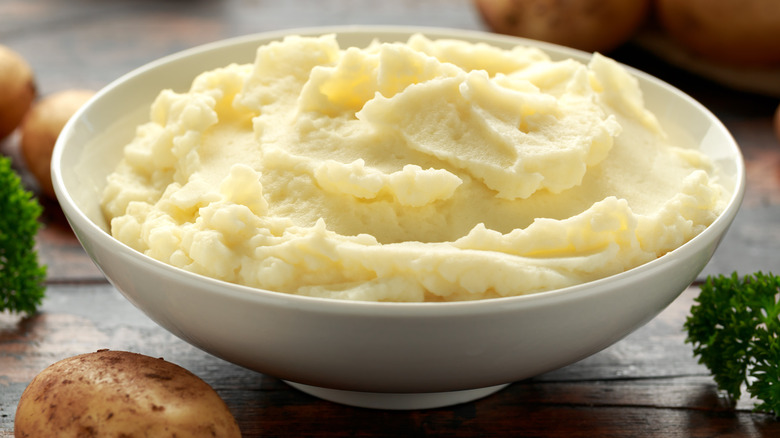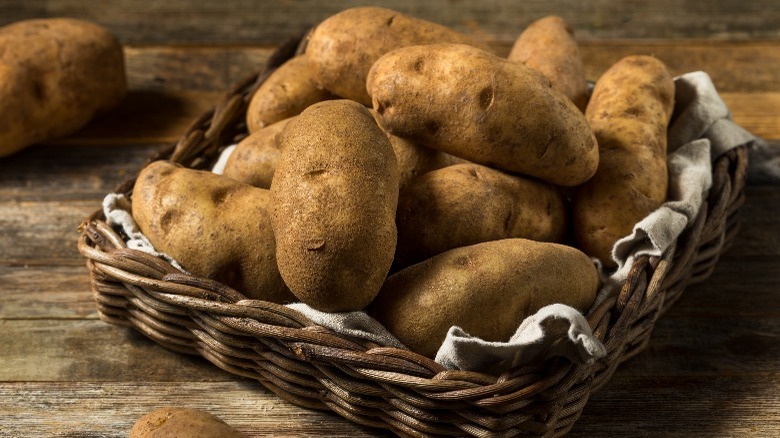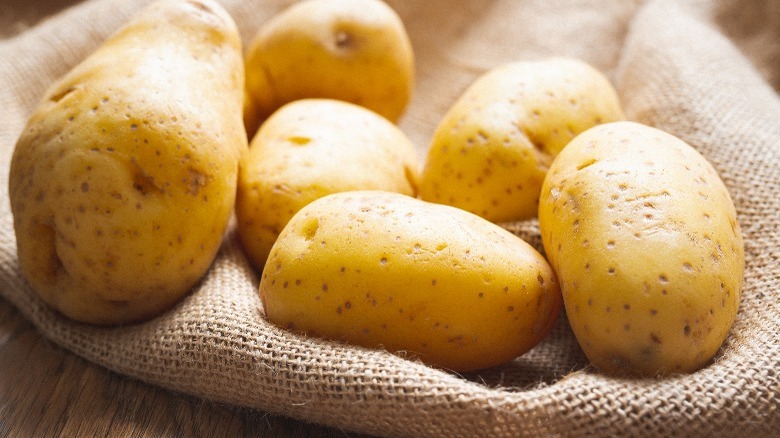The Best Potatoes For Thick Vs. Fluffy Mashed Potatoes
Mashed potatoes are a perfect comfort side dish, a basic yet rewarding recipe that can be paired with almost any sort of meat and veggie. Before you go squishing whatever potatoes are left in your pantry, however, it's important to remember that some types of tubers are more mashable than others. There are key differences in the starch content of different varieties of potatoes that will determine the texture and taste of your bowl of mash.
Mashed potatoes may have a beautiful simplicity to them, but the world of tuber cultivars can get a little complicated. In their original habitat in the Andes, potatoes came in all shapes, sizes, and colors, looking much more biologically diverse than the couple of species that are most commonly available in supermarkets today. When Spanish colonizers brought the crop back to Europe, farmers only grew a handful of specific varieties that eventually succumbed to blight due to a lack of genetic differences that would otherwise prevent a widespread outbreak. Today, breeders have reintroduced more biodiversity by developing cultivars that can all serve different culinary purposes.
Use russets for fluffier mashed potatoes
If any potato could be truly American, it would have to be the russet. Also known as Idaho potatoes, russets make up the bulk of the potato market in the United States due to their iconic status as the source for french fries. Due to their high starch content, russets are also effective in mashed form, especially if the menu calls for fluffiness. Their main appeal lies in their ability to absorb moisture and flavors, calling for a liberal amount of butter, salt, cream, and whatever else you want to add to personalize your dish.
Russets are sturdy, but be careful you don't abuse them too much lest you turn your delicate potato cloud into a gooey mess. Try to thoroughly drain them by cooking them in a dry pot after boiling them to ensure they don't absorb too much moisture, or perhaps roast them to avoid this step altogether. And whatever you do, never use a food processor, which will all but ensure that your mashed potatoes form into a gummy glob.
Yukon golds will yield thick and creamy mashed potatoes
Lots of starch makes for a lighter batch of mashed potatoes, but a thick, buttery dish requires a waxier type of potato with a bit more moisture. Enter the Yukon Gold, the smooth, yellow spuds that are found next to the bin of larger brown russets in the produce aisle. This cultivar has more of a flavor than its Idaho cousin, complete with earthy undertones and a natural hint of butter that perfectly compliments the other ingredients in a mashed potato recipe. They're also a bit harder to waterlog since they have less starch to absorb moisture.
Creaminess reigns supreme for Yukon Golds, which means that they work best in situations that require more heaviness (think giant Thanksgiving spreads where the mashed potatoes are one of the main star attractions). Potatoes that are too waxy, such as the red variety, won't work well for mashed dishes since the result will be much too chunky. Yukon Golds have the benefit of having just the right balance between starch and moisture to make a plate of mashed potatoes that's the ideal level of heaviness.



